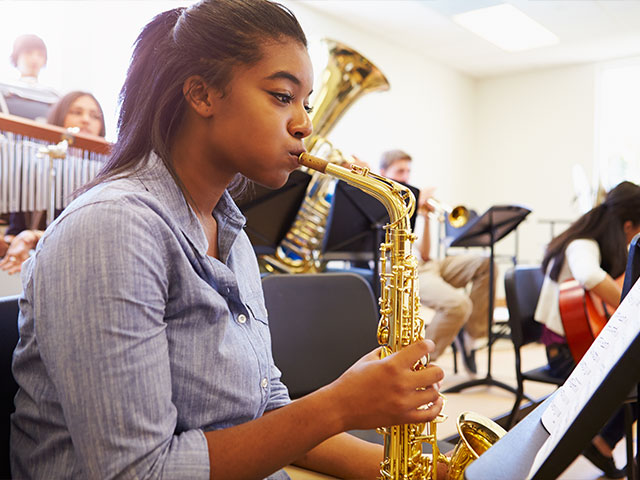Music Education (K-12)
This Program offers the Bachelor of Science in Music Teacher Education with two tracks, or two concentrations available:
Bachelor of Science in Music Teacher Education (Concentration in Wind and Percussion) or;
Bachelor of Science in Music Teacher Education (With a Concentration in Voice or Piano).

Our Programs/Concentrations
The Music Teacher Education program is designed to prepare music teachers in the schools, grades K-12. The program includes coursework in music theory, music history, and applied music study; required participation in music ensembles, as well as coursewor
Designed to prepare future music teachers with concentration in teaching music instrumental for elementary, secondary schools and college teaching positions as well. 134 hours are required for the completion of this degree.
Designed to prepare future music teachers with concentration in teaching vocal music or piano in elementary, secondary schools and college teaching positions. 131 hours are required for the completion of this degree.
What is Music Education?
Music education is a field of study associated with the teaching and learning of music. It touches on the development of the affective domain, including music appreciation and sensitivity. The incorporation of music training from preschool to postsecondary education is common in most nations because involvement in music is considered a fundamental component of human culture and behavior.
Why should I consider majoring in Music Education?
If you have a passion for music, and you like children and young adults, then a career combining the two might be for you. To succeed in the profession, you should have a broad knowledge of music, be creative (as a musician and a teacher), and be enthusiastic. You should also have a positive attitude and excellent communication skills.
What will I learn from studying Music Education?
The student majoring in music education will develop skills, concepts, and methodologies in the following areas: music, including music theory and composition, musicianship, history, arranging, orchestration, improvisation, and conducting; teaching with technology; solo performance techniques acquired through private instrumental or vocal study; vocal and instrumental techniques, pedagogy, and literature related to solo and ensemble performance; and the relationship of music to other fields of knowledge.
Music Education Curriculum
- 9 hrs. of English to include writing, literature and speech
- 9 hrs. of mathematics to include college algebra or above and geometry
- 9 hrs. of science to include earth science, life science and physical science with minimum of one associated laboratory
- 12 hrs. of social sciences to include American History and General Psychology
- 6 hrs. of humanities to include Philosophy and Fine Arts
- 3 hrs. of Pre-Teacher Education course (EDF 1005)
- 3 credit hours of ESOL (TSL 4081)
- 3 credit hours of Reading (RED 3333)
- 30 hrs. of Professional Education courses
- 30 hrs. of Content Area courses with at least a 2.5 GPA
- 6 credit hours of student teaching (internship)
What Can I do with a Music Education Degree?
| Public School Music Teacher | Private School Music Teacher | General Music Teacher |
| Choral Director |
Band Director |
Marching Band Director |
| Orchestra Director/Conductor | Private Music Instructor | Church Music Director/Conductor |
| Music Director | University Music Professor |

Contact Us
| Name | Phone | |
|---|---|---|
|
Dr. Vanessa Pitts Bannister |
vanessa.pittsbannister@famu.edu | (860) 412-6659 |
| Dr. Nicholas Thomas ASSOCIATE PROFESSOR |
nicholas.thomas@famu.edu | (850) 412-7256 |






